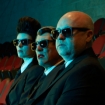This feature was originally published in 2008.
Instead of taking a lengthy break after touring for 1996's Ænima, Tool headed right back into the studio, were the musicians quickly got on each other's nerves. At the same time they became involved in frustrating legal battles with their former label and manager. The stress was too much and, following months of disharmony, Maynard James Keenan left to record with his new project, A Perfect Circle. He eventually returned and wrote the vocals for Lateralus, some of which documented the turbulence, like these words from "Schism": "No fault, none to blame/It doesn't mean I don't desire to/Point the finger, blame the other/Watch the temple topple over." Released in 2001, Lateralus probably should have been a train wreck, but somehow it wasn't. The internal tensions not only failed to damage the musical chemistry but actually seemed to strengthen the songs. Evocative, progressive, and imagistic, Lateralus is a moving palette of colors and emotions infused with lava-lamp guitars, dizzying rhythms, exotic tribal beats, and an ever-present sense of dread that keeps the music heavy even in the absence of obviously metallic structures. And while much of the record is inchoate and trippy, songs like "Schism," "Parabola," and "Ticks & Leeches" feature meaty riffs that prove that when they want to, Tool could still rock as hard as ever.
MAYNARD JAMES KEENAN The other guys were plodding along, trying to really take their time, and for me it was very frustrating. I understand that the process they have to go through involves taking every avenue possible and going down it to see if they get anywhere, and coming back and then starting over at another avenue. But it's a very tedious and long process that doesn't really lend itself to telling a story. I kind of need some of the foundation there, because if the foundation keeps changing, the story's gonna keep changing. I realized that if I had to go through an entire two- or three-year process of trying to write like that, I was going to go out of my mind. I needed to get things on paper and express them and get them on tape way sooner than that. So that's when I went and worked with my roommate, Billy Howerdel, to do A Perfect Circle. I had no idea that it was gonna blow up as big as it did. I thought we were just going to be messing around town, doing some club gigs and having fun with it. And then right underneath our feet, it just kind of took off. I didn't really kick and scream. I went with it willingly.
ADAM JONES The communication was so bad at that point. I'm one of those guys that goes, "What's happening?" and "Why are you upset?" And other people are going, "I'm not upset." But they really are. We were at that height where we were in a successful band and yet we were all kind of growing apart almost because of it, and people aren't communicating and other people's feelings are getting hurt. The biggest problem I had was that I never knew what was really going on. And then Maynard left, and while Maynard was making plans with A Perfect Circle, we were making plans as well. And I was sitting there thinking, Well, OK, when are you gonna be done with this so we can do our thing?
JUSTIN CHANCELLOR I definitely felt the band was in jeopardy at that point, but I've often felt that. And the way we always get through it is to not push it and not expect things to suddenly be OK. We let them play themselves out and eventually deal with the problems and see if we can get further. And sometimes that takes a bunch of time. And it takes leaving each other alone for months and then coming back. It takes fighting with each other. It's never quite come to fistfights, but it's been really very explosive. But every time that's happened, we've gotten a lot further and that's really how we've managed to carry on. If you try to ignore that stuff, then there's no hope in going on at all.
KEENAN After I finished with A Perfect Circle, coming back to the Tool camp caused a lot of tension. "Where were you? You're off with your mistress again" — that kind of thing. We've since navigated that, but of course initially it was always a sore spot and it made getting into Lateralus a bit of a chore. But it's really the friction, that juxtaposition of forces that makes good art. Having said that, if there's any criticism I have of us it's that we tend to forget to step out of that character and go, "Oh, yeah, this is all fun. It's supposed to be art. It's supposed to be a release. It's not supposed to give us ulcers."
CHANCELLOR For me, the song "Lateralus" was the turning point. I wrote a bar of nine, a bar of eight, and a bar of seven, and we originally called the song "987." I saw it as something that kept getting shorter and shorter and, like a spiral, it kind of folds in on itself. And Maynard had no idea what I was thinking when he went to track the vocals. But as the song's folding and changing, he's singing about the idea of a spiral and how you're basically trying to achieve something that's never been achieved and you have to keep reaching for something that you don't understand. I thought that was an incredible synchronicity. Then a friend said, "Justin, do you realize that 987 is the 16th number of the Fibonacci sequence? It's the mathematical equation for a spiral." I'm not the most spiritual person, but all that stuff was almost like a reward for all our efforts, and I felt like it got us back on track.
KEENAN For the lyrics on Laterlus, I wanted to address the same kind of stuff as Ænima. I wanted to explore that sense of release, kind of combining archetypes with where we were in our lives at that point. On the previous album, we had gone through that whole transformation, what some refer to as the "Saturn return" — your 28th or 29th year, when you're given the opportunity to transform from whatever your hangups were before and to let the light of knowledge and experience lighten your load, so to speak, and let go of old patterns and embrace a new life. It's kind of the story of Jonah and the belly of the whale. You kind of sink or swim at that point. And a lot of people don't make it. Hendrix, Janis Joplin, and Kurt Cobain didn't quite make it past their Saturn return. For me, starting to recognize those patterns, it was very important to start constructing songs that chronicled that process, hoping that my gift back would be to share that path and hope that I could help somebody get past that spot. And the first step in that is just being aware of it.
DANNY CAREY To see that record get accepted and go to No. 1 on the charts was such a relief. I remember that even when we had finished it we were like, "God, this is really fucking crazy. These songs are even longer than the ones on Ænima and some of them are weirder and more psychedelic." We thought, Oh man, are people gonna even want to hear this? At that point, it had been five years since Ænima and it felt like people's attention spans had gotten even shorter. There was all this DJ shit going on and no one was even listening to live bands in a lot of clubs. I remember Nine Inch Nails put out The Fragile, which I thought was pure genius, and it hardly sold any copies. We were like, "Goddamn, are we gonna get dissed, too?"












